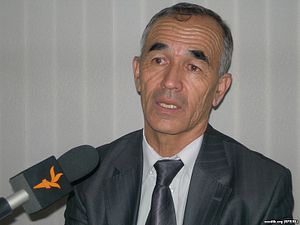In April, when the UN Human Rights Committee finally weighed in on the case of Azimjon Askarov the body called on Kyrgyz authorities to immediately release the prominent human rights advocate from jail, quash his conviction, and “if necessary, conduct a new trial, in accordance with the principles of fair hearings, presumption of innocence and other procedural safeguards.”
The response from Bishkek was in part typical, with populist politicians mumbling about international meddling in Kyrgyz affairs and President Almazbek Atambayev suggesting that the Kyrgyz Constitution needed to be changed, ostensibly because the part that permits citizens to petition international bodies to protect their rights and obligates the state to comply undermine, he said, the country’s sovereignty.
Ainash Tokbaeva, the chairwoman of the Kygryz Supreme Court, said the court would have to revisit its 2011 decision to uphold Askarov’s conviction. This week–two months after the UN committee’s decision–the Kyrgyz Supreme Court has set a date for Askarov’s new appeal: July 11.
In early June, authorities moved to seize Askarov’s home. I wrote at the time that “[t]he property seizure is either a badly-timed coincidence or falls into an established pattern in which authorities carry out alternative ways of punishing people. In many former Soviet states, authorities will target family or property of those who have–in the eyes of the elite–embarrassed the state on an international stage.”
While it is good news that Askarov will have his day (again) in court–it’s a long way from vindication for the man rights advocates say (and the UN committee’s decision agrees) has been the victim of torture, his conviction a result of politics rather than law. Trials across the Central Asian region often have the trappings of fairness, but not the substance. The Askarov case in particular will be closely watched internationally and seen as a bellwether on progress in the Kyrgyz legal system.
The best case scenario would see the 65-year-old Askarov released as per the UN committee’s recommendation, but such a conclusion is hard to square with past precedent. Askarov, if vindicated by a Kyrgyz court, would then be a living (and free) embarrassment to the Atambayev administration which saw him convicted of participating in the murder of a policeman in southern Kyrgyzstan during the 2010 revolution that brought the present government into power.
Kyrgyzstan will hold a presidential election next year in which Atambayev cannot run and is thus on the verge of breaking the regional mold with regard to elections and personality-cult politics. The maturation of Kyrgyzstan’s legal system is part of breaking that mold as well, and the Askarov case is quite the stress test.































